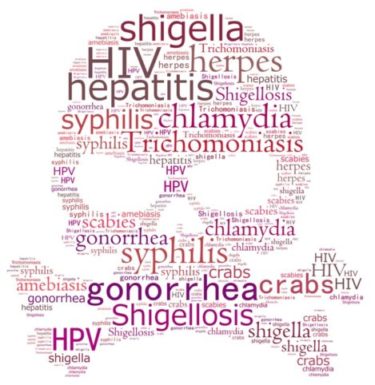SHARES

Nisa has never gotten a cold sore in all of her 23 years, until her boyfriend went down on her one night. When she ended up with a cold sore the next day, she started experiencing pain and itching *down there*. Initially, she thought it was an irritation from wearing a new tight underwear all day. However, it persisted for a few days then, one morning it dawned on her that the cold sore virus can also cause herpes. Later she confirmed on Google her worst fears and what she was unaware of. She is among the approximately 20 percent of people who never had a cold sore (and therefore no immunity to the oral herpes simplex virus, HSV1) and probably contracted genital herpes from the HSVI virus.
Indeed, if only she knew better, Nisa wouldn’t have to go through what she did.
Sexually Transmitted Disease
Sexually transmitted diseases (STD) are infections which you can pass to another person through sexual contact, whether vaginal, anal and oral sex. Not to mention that even sharing needles or even breastfeeding can transmit some specific STDs.
As a matter of fact, sexual contact can transmit more than 30 different bacteria, viruses and parasites. Particularly, eight of these disease causing microorganisms have the highest incidence of sexually transmitted disease. To point out, four of these infections, syphilis, gonorrhoea, chlamydia and trichomoniasis are curable. On the contrary, the other four, hepatitis B, herpes simplex virus (HSV), HIV and human papillomavirus (HPV), are viral infections which are incurable.
Frequently, common symptoms of sexually transmitted disease include vaginal discharge, urethral discharge, or burning sensation, genital ulcers and abdominal pain. However it is important to realise a person can have sexually transmitted diseases without experiencing symptoms.
Consequences of Sexually Transmitted Disease
- STDs such as herpes and syphilis can increase the risk of patient getting HIV.
- Human papilloma virus (HPV) infection had increased the incidence of cervical cancer and the number of deaths.
- STD such as gonorrhoea and chlamydia are the major cause of the pelvic inflammatory disease and infertility in women.
- Mother-to-child transmission of STD can result in stillbirth, neonatal death, low birth weight, prematurity, sepsis, pneumonia and congenital deformities.
Prevention of Sexually Transmitted Diseases
Barrier methods
Condom usage is one of the most effective methods of prevention against sexually transmitted diseases including HIV. However you must use condoms correctly and consistently to be effective. The majority mostly prefer male condoms in comparison to the female condom.
Counseling
Counseling usually provides a primary prevention against sexually transmitted disease as well as against unwanted pregnancies. Furthermore it can create awareness among the public, so they are educated about STDs:
- Comprehensive sexual education.
- STD and HIV counseling.
- Condom promotion.
- Safer sex counseling.
Diagnosis of Sexually Transmitted Disease
When your sexual history and current symptoms indicate STD, laboratory tests can be carried out to determine the cause.
- Blood test – can confirm the diagnosis of HIV and later stages of syphilis.
- Urine test – some sexually transmitted disease can be confirmed with a urine sample.
- Fluid sample – testing fluids and samples from the active genital sores can be used to diagnose the type of infection.
Screening for Sexually Transmitted Disease
- HIV screening test is suggested to everyone ages between 13 to 64 years old.
- Screening for HIV, hepatitis B, chlamydia and syphilis for pregnant women.
- Pap smear test to detect HPV for women age 21 years old and above.
- Women under age of 25 who are sexually active, to screen for chlamydia infection.
- People with HIV tend to have higher risk of getting other STD’s.
- People who have a new partner.
Treatment
At this time, effective treatment is currently available for several sexually transmitted diseases:
- Three bacterial STD (gonorrhea, chlamydia and syphilis) and one parasitic STD (trichomoniasis) are curable with effective single-dose regimes of antibiotics.
- For herpes and HIV, the most effective medications are antivirals which can modulate the course of the disease, although they cannot cure the disease.
- It is important to abstain from sex until you have completed treatment and any sores have healed.
Take a responsible approach to getting intimate with another person, and it could protect you from a range of health problems in the future.
Find a GP/Family Doctor in Malaysia, on GetDoc
Find a GP/Family Doctor in Singapore, on GetDoc
Reference
- Sexually transmitted infections. [Internet][cited 2019 March 19] Available from:
https://www.who.int/news-room/fact-sheets/detail/sexually-transmitted-infections-(stis)
- Sexually transmitted diseases. [Internet][cited 2019 March 19] Available from:
https://www.medicalnewstoday.com/articles/246491.php
- Sexually transmitted diseases. [Internet][cited 2019 March 19] Available from:
- What are STD? [Internet][cited 2019 March 19] Available from:
by Leelah
'' The first step towards a change is awareness !'' The saying which inspired the medical graduate to reach the public through GetDoc. View all articles by Leelah.







